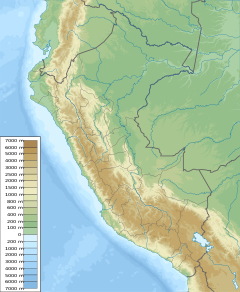Pumasillo
| Pumasillo | |
|---|---|
 Pumasillo | |
| Highest point | |
| Elevation | 5,991 m (19,656 ft)[1] |
| Prominence | 1,397 m (4,583 ft)[2] |
| Parent peak | Salcantay |
| Listing | , |
| Coordinates | 13°14′57″S 72°49′09″W / 13.24917°S 72.81917°W |
| Naming | |
| English translation | Puma claw |
| Language of name | Quechua |
| Geography | |
| Location | Cusco, Peru |
| Parent range | Andes, Vilcabamba |
| Climbing | |
| First ascent | 07/26/1957 - Mike Gravina and Simon Clark (UK) via west ridge[3][4] |
Pumasillo (possibly from Quechua puma cougar, puma, sillu claw, "puma claw") is a mountain in the Vilcabamba mountain range in the Andes of Peru, about 5,991 m (19,656 ft) high[5]. Pumasillo or Sacsarayoc also refers to the whole massif. It includes the peaks Pumasillo, Sacsarayoc and Lasunayoc. It is located in the Cusco Region, La Convención Province. Its slopes are within the administrative boundaries of the Peruvian city of Santa Teresa.[6]
Elevation
[edit]Other data from available digital elevation models: SRTM 5976 metres[7] and TanDEM-X 5849 metres.[8] The height of the nearest key col is 4594 meters, leading to a topographic prominence of 1397 meters.[9] Pumasillo is considered a Mountain Subrange according to the Dominance System [10] and its dominance is 23.32%. Its parent peak is Salcantay and the Topographic isolation is 30.9 kilometers.[9]
First Ascent
[edit]Pumasillo was first climbed by Mike Gravina and Simon Clark (UK) on 26 July 1957.[4][11] Harry Carslake and John Longland (the son of Jack Longland[12]), their expedition team-mates, reached the summit two days later and so did Colin Darbyshire, Kim Meldrum and Ronnie Wathen on the following day.[13]
References
[edit]- ^ allthemountains.com Map of the Vilcabamba mountain range around Pumasillo
- ^ "Pumasillo / Sacsarayoc". Andes Specialists. Retrieved 2020-04-12.
- ^ Jill Neate, Mountaineering in the Andes, 1994
- ^ a b "AAJ (American Alpine Journal) South America, Perú, Pumasillo, Vilcabamba". AAJ (American Alpine Journal) South America, Perú, Pumasillo, Vilcabamba. 1958.
- ^ Biggar, John (2020). The Andes a guide for climbers (5th ed.). Castle Douglas, Scotland: The Andes. ISBN 978-0-9536087-7-5. OCLC 1260820889. Retrieved 15 September 2024.
- ^ PERU, Autor: GEO GPS. "Base de datos Perú - Shapefile - *.shp - MINAM - IGN - Límites Políticos". Retrieved 2020-04-30.
- ^ NASA, Jet Propulsion Laboratory. "Shuttle Radar Topographic Mission - Filled Data V2". Retrieved 12 April 2020.
- ^ TanDEM-X, TerraSAR-X. "Copernicus Space Component Data Access". Retrieved 12 April 2020.
- ^ a b "Pumasillo / Sacsarayoc". Andes Specialists. Retrieved 2020-04-12.
- ^ "Dominance - Page 2". www.8000ers.com. Retrieved 2020-04-12.
- ^ Clark, Simon (1959). The Pumas Claw. Adventurer's Club. Retrieved 14 September 2024.
- ^ Harding, J. G. R. (1993). "In Memoriam: John Henderson Longland 1936 – 1991" (PDF). Alpine Journal. #98 (342): 317–319. ISBN 978-0948153273. ISSN 0065-6569. Retrieved 15 September 2024.
- ^ Longland, John H. (1958). "Cambridge on Pumasillo" (PDF). Alpine Journal. #63 (297): 9–17. ISSN 0065-6569. Retrieved 15 September 2024.

